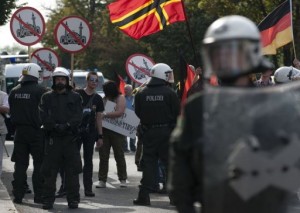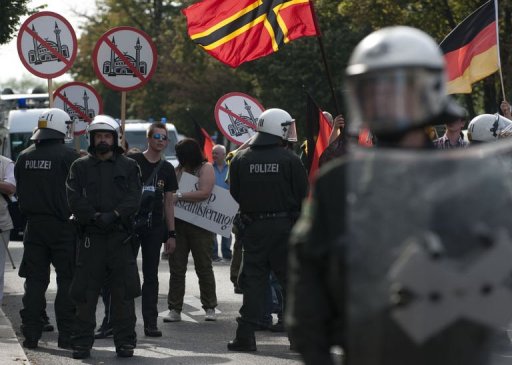
AFP / Barbara Sax
BERLIN (AFP)
German politicians and Muslim groups are agonising over whether to ban a small far-right group from screening in public an anti-Islam film that has sparked violent protests from Pakistan to Sudan.
The Pro Deutschland (Pro Germany) group has vowed to show the full-length version of the film “Innocence of Muslims”, which was made in America and has been deemed insulting to Islam in a cinema, in Berlin, which has a large Muslim community.
Fearing the sort of violence that has swept parts of the Islamic world, including Germany’s own embassy in Khartoum, German authorities have said they will make efforts at banning showing the film.
Interior Minister Hans-Peter Friedrich said such a screening would be a “political action” that would only serve to “pour oil on the fire”.
Banning the film, he said, would not constitute an attack on the freedom of expression.
“In this case, I consider it appropriate to consider all legal possibilities linked to the right to hold public demonstrations … to see how we can act against it,” Friedrich told Phoenix rolling news channel on Tuesday.
For her part, Chancellor Angela Merkel told a news conference earlier in the week she could see “good reasons” to prevent the film being screened.
Merkel, who hails from former communist East Germany and often refers to her attachment to freedom of expression, said the question was whether the film was a risk to national security.
Germany itself has come under attack with its embassy in the Sudanese capital being stormed and set ablaze on Friday by protesters as demonstrations against the film swept the Muslim world.
Islamists have frequently deplored the country’s military role in Afghanistan, where Germany is the third-largest provider of troops in the NATO-led force.
Merkel also inflamed tempers in September 2010 when she spoke out in defence of a Danish cartoonist whose drawing of the Prophet Mohammed with a bomb for a turban, first published in 2005, earned him death threats, as he was given an award in Germany.
Authorities in Berlin, home to more than 100,000 citizens of Turkish descent, called for cinema managers to boycott the film.
“We should allow no room” for “targeted provocation”, said Dilek Kolat, a politician responsible for integration issues in the city-state.
The Muslim community appeared to be split on the issue, however.
The Coordinating Council of Muslims (KRM) in Germany called for the video to be banned while the head of the Liberal-Muslim Association said preventing the film from being shown was counter-productive.
“The more this content is made taboo, the more damage is done,” Lamya Kaddor told the left-leaning daily Tageszeitung.
Many see the threat to screen the film as the latest provocation from a group with dwindling support.
Pro Deutschland, run by a former neo-Nazi, classifies itself as a “citizens’ movement” protesting at what it sees as the “Islamisation of Germany”.
Its protests sometimes attract a mere handful of people and it won 1.2-percent of the vote in the most recent regional elections in Berlin last year.
It has nevertheless succeeded in sparking debate and occasional violence in Germany, most recently when a regional branch of the party used anti-Islamic caricatures to provoke a group of ultra-conservative Muslims.
German media were near unanimous in the opinion that the film should not be outlawed.
“Should the anti-Islam video that has caused outrage across half the world be banned here in Germany? The answer must be: no,” said mass-circulation daily Bild.
The Financial Times Deutschland said that banning the film would be a “victory for the extremists” while the Sueddeutsche Zeitung said it would allow Pro Deutschland to set themselves up as “martyrs for freedom of speech”.

